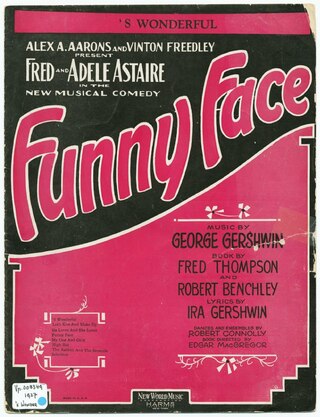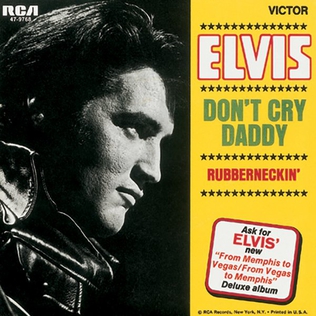Related Research Articles
"Mack the Knife" or "The Ballad of Mack the Knife" is a song composed by Kurt Weill with lyrics by Bertolt Brecht for their 1928 music drama The Threepenny Opera. The song tells of a knife-wielding criminal of the London underworld named Macheath, the "Mack the Knife" of the title.
Forbidden Broadway, known also as Forbidden Broadway, Volume 1, is the first album released by Gerard Alessandrini, the creator of Forbidden Broadway. Because the album features the five cast members from the original show, the album bears the label "Original Cast Recording."
"Smile" is a song based on the theme song used in the soundtrack for Charlie Chaplin's 1936 film Modern Times.

"People" is a song composed by Jule Styne with lyrics by Bob Merrill for the 1964 Broadway musical Funny Girl starring Barbra Streisand, who introduced the song. The song was released as a single in 1964 with "I Am Woman", a solo version of "You Are Woman, I Am Man", also from Funny Girl.

"Who's Sorry Now?" is a popular song with music written by Ted Snyder and lyrics by Bert Kalmar and Harry Ruby. It was published in 1923 as a waltz. Isham Jones had a hit recording in 1923 with the song arranged as a foxtrot. Later sheet music arrangements, such as the 1946 publication that was a tie-in to the film A Night in Casablanca, were published in 2
2 time. Other popular versions in 1923 were by Marion Harris, Original Memphis Five, Lewis James, and Irving Kaufman.

People is Barbra Streisand's fourth solo studio album, released in September 1964. The title track was a newly recorded version of the hit song from the Broadway musical Funny Girl in which Streisand starred.

"I'll Never Fall in Love Again" is a popular song by composer Burt Bacharach and lyricist Hal David that was written for the 1968 musical Promises, Promises. Several recordings of the song were released in 1969; the most popular versions were by Dionne Warwick, who took it to number 6 on Billboard magazine's Hot 100 and spent three weeks topping the magazine's list of the most popular Easy Listening songs, and Bobbie Gentry, who topped the UK chart with her recording and also peaked at number 1 in Australia and Ireland, number 3 in South Africa and number 5 in Norway.

"The Next Time I Fall" is a song written by Bobby Caldwell and Paul Gordon and recorded by a duet of Peter Cetera and Amy Grant for Cetera's 1986 album Solitude/Solitaire. It reached number one on Billboard magazine's Hot 100 and Adult Contemporary chart and was nominated for a Grammy Award for Best Pop Performance by a Duo or Group with Vocals. In February 2020, it was listed on a Billboard pop music list of top 25 love song duets.
"Who Can I Turn To?" (alternatively titled "Who Can I Turn To (When Nobody Needs Me)") is a song written by English composer-lyricists Leslie Bricusse and Anthony Newley and first published in 1964.

"'S Wonderful" is a 1927 popular song composed by George Gershwin, with lyrics written by Ira Gershwin. It was introduced in the Broadway musical Funny Face (1927) by Adele Astaire and Allen Kearns.
"Everything I Have Is Yours" is a popular song. The music was written by Burton Lane, the lyrics by Harold Adamson. The song was published in 1933. It was first sung by Art Jarrett in the 1933 film Dancing Lady.

Happy Hunting is a 1956 musical with a book by Howard Lindsay and Russel Crouse, lyrics by Matt Dubey, music by Harold Karr, original choreography by Alex Romero, assistant choreographer Eugene Louis Faccuito (Luigi). The plot focuses on wealthy Philadelphia Main Line widow Liz Livingstone and her efforts to find a royal husband for her daughter Beth.
"Autumn in New York" is a jazz standard and popular song composed by Vernon Duke in Westport, Connecticut in the summer of 1934. It was written without a commission or for a specific show, but Duke offered it to producer Murray Anderson for his Broadway musical Thumbs Up! The play opened on December 27, 1934, when the song was performed by singer J. Harold Murray.
"I've Got a Crush on You" is a song composed by George Gershwin, with lyrics by Ira Gershwin. It is unique among Gershwin compositions in that it was used for two different Broadway productions: Treasure Girl (1928), when it was introduced by Clifton Webb and Mary Hay, and Strike Up the Band (1930), when it was sung by Doris Carson and Gordon Smith. It was later included in the tribute musical Nice Work If You Can Get It (2012), in which it was sung by Jennifer Laura Thompson. When covered by Frank Sinatra he was a part of Columbia Records.
"I Guess I'll Have to Change My Plan" is a popular song published in 1929, with music by Arthur Schwartz and lyrics by Howard Dietz.
"Old Devil Moon" is a popular song composed by Burton Lane with lyrics by Yip Harburg for the 1947 musical Finian's Rainbow. It was introduced by Ella Logan and Donald Richards in the Broadway show. The song takes its title from a phrase in "Fun to Be Fooled", a song that Harburg wrote with Harold Arlen and Ira Gershwin for the 1934 musical Life Begins at 8:40.

"Don't Cry Daddy" is a 1969 song recorded by Elvis Presley written by Mac Davis. The song was paired with "Rubberneckin'" and both peaked at number six in the United States Billboard Hot 100 chart in January 1970.
"Standing on the Corner" is a popular song written by Frank Loesser and published in 1956. It was introduced by Shorty Long, Alan Gilbert, John Henson, and Roy Lazarus in the Broadway musical, The Most Happy Fella.
"Happy Days and Lonely Nights" is a torch song written by Billy Rose and Fred Fisher, first recorded by The Harmony Brothers on May 18, 1928. The song was successfully revived in the 1950s in the US by the Fontane Sisters and in the UK most successfully by Ruby Murray.
"'Deed I Do" is a 1926 jazz standard composed by Fred Rose with lyrics by Walter Hirsch. It was introduced by vaudeville performer S. L. Stambaugh and popularized by Ben Bernie's recording. It was recorded by influential clarinetist and bandleader Benny Goodman as his debut recording in December 1926 with Ben Pollack and His Californians. Ruth Etting's rendition of the song became a top ten hit in 1927 as did the version by Johnny Marvin.
References
- ↑ Dubey, Matt; Karr, Harold (1956). "Mutual Admiration Society". Happy Hunting. Top40db. Retrieved 2009-06-25.
- ↑ Dubey, Matt; Karr, Harold (1956). "Mutual Admiration Society". Happy Hunting. International Lyrics Playground. Retrieved 2009-06-25.
- ↑ Whitburn, Joel (2013). Joel Whitburn's Top Pop Singles, 14th Edition: 1955-2012. Record Research. p. 109.